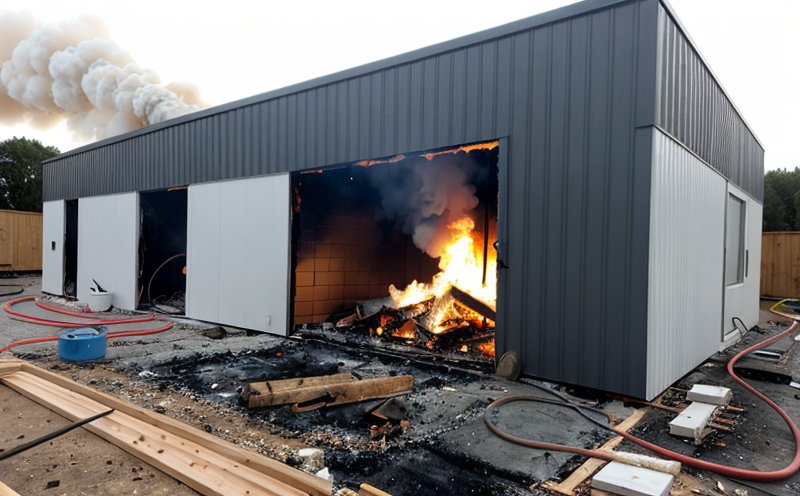Reaction-to-Fire Classification for Rigid Foam Panels
The reaction-to-fire (RFF) classification of rigid foam panels is a critical step in ensuring that building materials meet stringent fire safety standards. This classification process evaluates how the material behaves when exposed to heat and flame, determining its potential to contribute to or reduce fire spread within a structure.
The primary test used for this purpose is the Horizontal Burning Test, which simulates real-world scenarios where combustible materials are exposed to an ignition source. This test evaluates the material's ability to resist burning and limits the formation of smoke, toxic gases, and potential structural damage. The results from these tests can significantly impact product development, compliance with building codes, and insurance premiums.
The process begins by preparing standardized specimens that accurately represent the intended use of the rigid foam panels. These samples are then subjected to a controlled environment where they are exposed to an open flame for 10 seconds. The test measures key parameters such as burn rate, mass loss, smoke production, and the formation of noxious gases.
After the test, the material's performance is classified based on its behavior during combustion. This classification helps determine the flammability rating (e.g., UL94 or ISO 13567-2) which can influence the material's suitability for various applications, including insulation and cladding in buildings.
The importance of accurate RFF testing cannot be overstated. Inadequate fire performance can lead to significant structural failures during a blaze, posing severe risks to occupants and firefighters alike. Proper classification ensures that materials are used correctly and safely within the intended application, minimizing fire hazards.
- Why Choose This Test: Accurate RFF testing is essential for compliance with international standards such as ASTM E84 and ISO 13567-2. It provides critical data on material flammability which can impact insurance rates, product safety, and regulatory compliance.
- International Acceptance and Recognition: The results of RFF tests are widely accepted across the globe, with many countries requiring specific classifications for fire-safe materials in construction projects.
The test process itself is highly standardized to ensure consistency and reliability. This includes precise specimen preparation, controlled environmental conditions, and rigorous measurement techniques. Properly conducted testing not only aids in product development but also ensures that the final material can be used safely in a variety of applications.
For quality managers and compliance officers, understanding the nuances of RFF testing is crucial for ensuring that materials meet all necessary standards. This knowledge helps in making informed decisions about procurement and production processes, ultimately leading to safer products and more compliant buildings.
Eurolab Advantages
At Eurolab, we pride ourselves on providing comprehensive fire safety testing services tailored specifically for the needs of our clients. Our team of experts ensures that every test is conducted with precision and accuracy, leveraging state-of-the-art equipment to deliver reliable results.
- Expertise: Our lab technicians are highly trained in all aspects of RFF testing, ensuring that each specimen is prepared correctly and tested under optimal conditions.
- Accreditation: Eurolab is accredited by the relevant national standards bodies, guaranteeing the highest level of reliability and accuracy for our test results.
- Technology: We utilize advanced instrumentation to monitor key parameters during testing, providing detailed insights into material performance under fire conditions.
- Compliance: Our tests are conducted in strict adherence to international standards such as ASTM E84 and ISO 13567-2, ensuring that the results are recognized globally.
- Speed: We understand the importance of timely testing and reporting, offering fast turnaround times without compromising on quality.
- Confidentiality: Eurolab maintains strict confidentiality protocols to protect our clients' proprietary information throughout the testing process.
By choosing Eurolab for your RFF testing needs, you can be confident in the reliability and accuracy of the results. Our commitment to quality and customer satisfaction has made us a trusted partner in the fire safety industry for over two decades.





